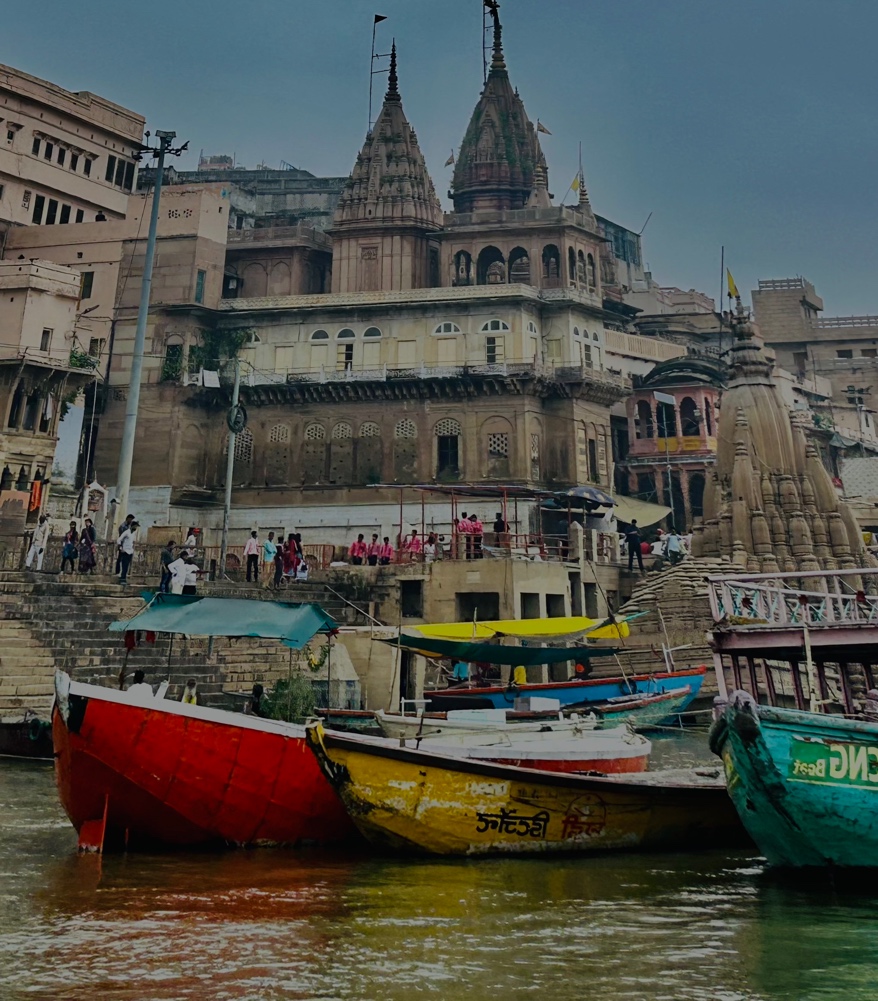
Above: Image of one of the Ghats taken on arrival, from the boat shuttle ride to the Brij Rama Palace Hotel, October 2024
The moment I began to pen down this account of my experience of Varanasi, I struggled to coin a suitable tagline for the title, one that would not only pay sufficient homage to the subject, but also whet the appetite of the reader for further enquiry …
… Alas, each one of them felt and sounded either insipid or hackneyed, for it is next to impossible to be original and measured when describing this ancient living city in words, to be neither too florid nor elegiac in tone, tenor and choice of adjectives, and yet not, by virtue of restraint, lapse into the mundane.
I suspect the painter has an easier time depicting both the subject and sentiments it elicits, the medium permitting – if not commanding – the liberal use of figurative metaphors, without rendering the narrative obscure …
… In the same vein, it would take an exceptionally skilled writer with a fertile imagination, philosophical depth and profound understanding of human psychology, to be able to spin a yarn staged in and around Varanasi that serves not only to kindle sensations, but also conjure images of this altogether ethereal, and even otherworldly city in the heart and mind of the reader … Geoff Dyer’s ‘Jeff in Venice, Death in Varanasi’, whilst both compelling and entertaining, doesn’t quite make the cut.
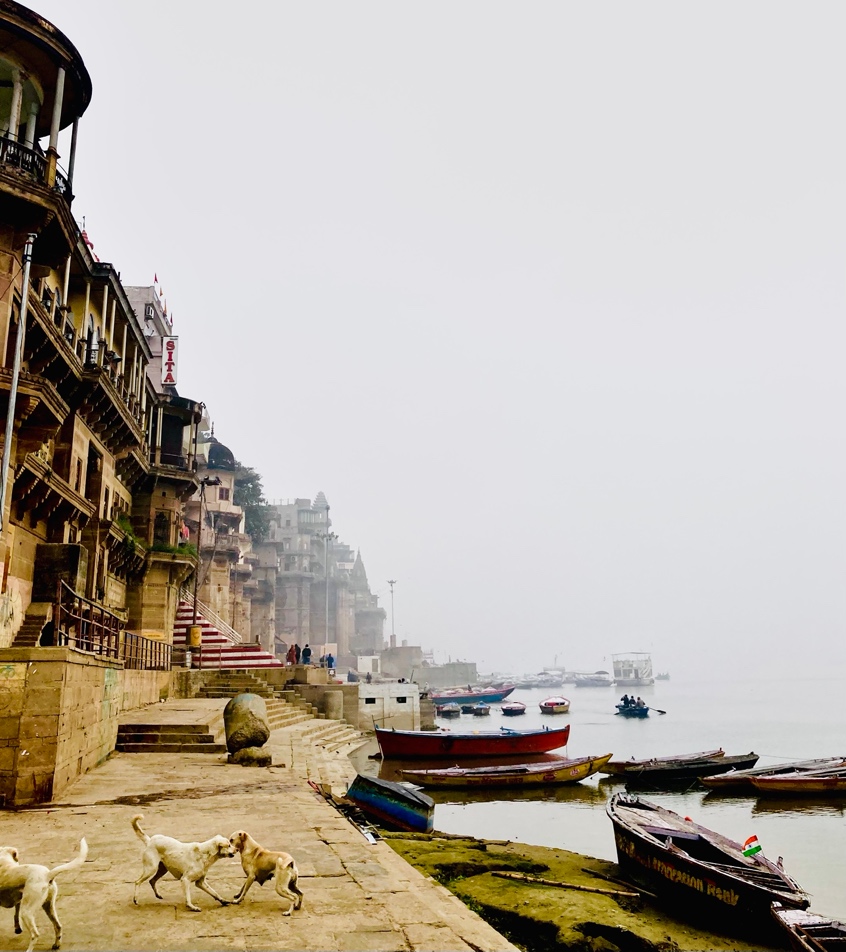
Above: Image taken from banks of Babua Pandey Ghat, Varanasi, January 2022
I myself am neither an artist nor an especially skilled writer, but rather a recorder of what my mind and senses perceive, painfully sublunary, helplessly literal and thereby forced to approach my subject without intermediary; I will however endeavour to be as impressionist as I can, for Varanasi is able to wrest the poetic from even the most compulsively prosaic …
… In the bargain, I shall pepper this attempt at a ‘photo-journalistic’ piece with both titled and untitled images, the latter those I cannot quite orient but which continue to take my breath away each and every time I behold them … in fact, I would go so far as to say, in the spirit of American crooner Tony Bennett’s signature song ‘I left my heart in San Francisco’, that I left mine in Varanasi.
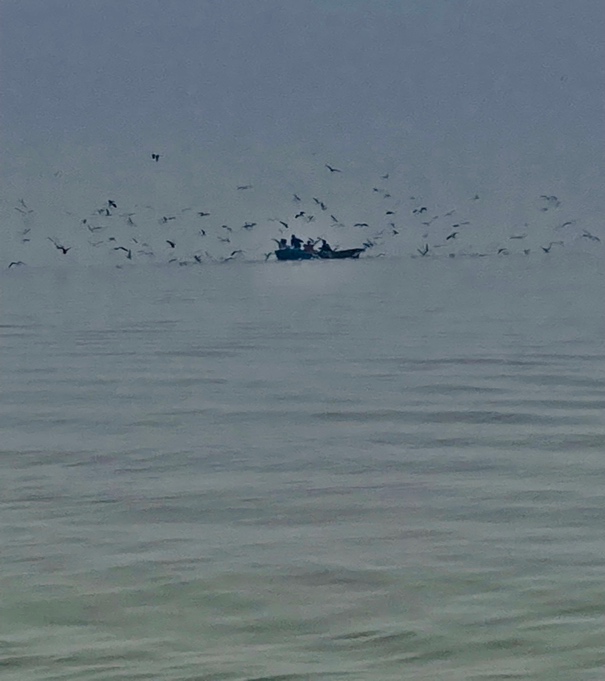
Above: Image taken from a Boat ride, January 2022
I have been three times, the first in September 2021, seven months after the death of my father, seven months during which I had been paralysed by grief, a grief that had become central to the contours of my little universe and gradually colonised my identity …
… Until the day after I arrived in Varanasi and was not only humbled, but also subliminally made to feel ashamed of my self-indulgent, even pompous sense of persecution, borne of a loss, which however traumatic in the way that it unfolded, was an inevitable one, pre-ordained from birth and determined by the deceased’s own karma and destiny, not for another to intervene in, control, attempt to bypass, or for that matter even mourn …
… In Varanasi, death is received and treated with a remarkable – but not disrespectful – practicality that equalizes all life, neutralizes the potency of personal grief and symbolically evokes salvation i.e. the end of the painful cycle of rebirth.
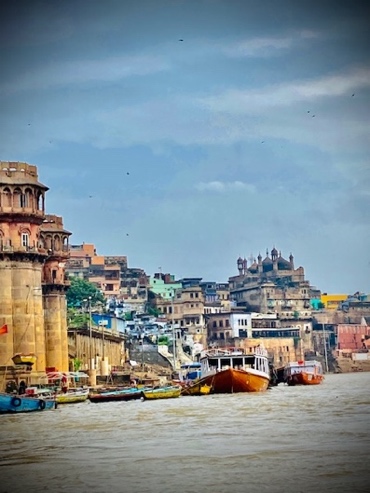
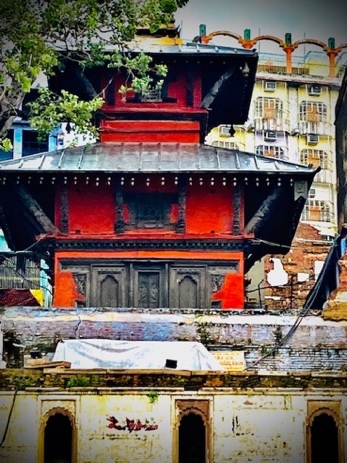
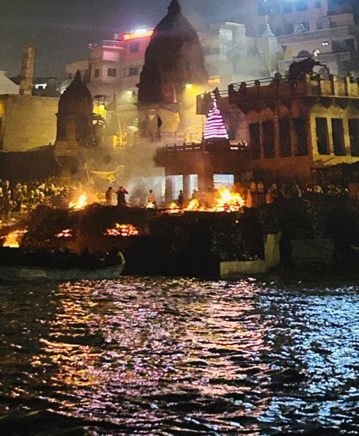
Above, left to right: Image taken from a boat ride in September 2021, Kathwala Nepali Temple, Lalita Ghat September 2021, Night-time Image of pyres at Manikarnika, aka the Burning Ghat, in Varanasi, October 2024
And on that hopefully uplifting punctuation to my unburdening myself of the sombre reasons for my deep bond with Varanasi, I shall change course entirely to a lighter and even somewhat playful reportage, for as much as Varanasi is one of the seven sacred cities of Hinduism, it does not singularly elicit or demand rigorous piety, and if anything should be amongst the top ten choices for a weekend of pure rest & recuperation away from the trials & tribulations of city living, especially if one does it ‘The BrijRama’ way …
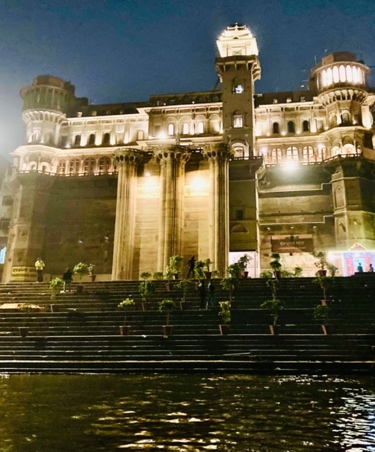


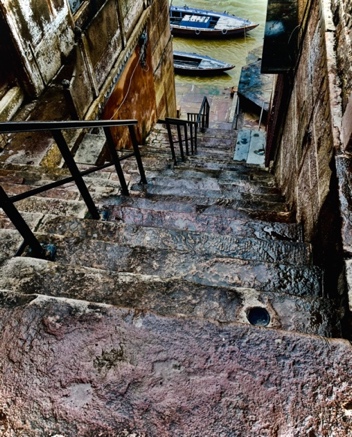
Above: Façade of The BrijRama Palace Hotel at night, January 2022
Below: Majestic steps leading down to the ghat from the side entrance of the Brij Rama Hotel, September 2021
… The BrijRama palace hotel located at Darbhanga Ghat, provides the most privileged, protective and aesthetically pleasing experience of the city, from the moment one is received at the airport and driven to a ghat at which a private motor boat belonging to the hotel will slowly shuttle you to your destination, one of the members of the receiving party giving a running commentary of the sights, whilst another shakes up a delicious lime water served in little clay goblets.
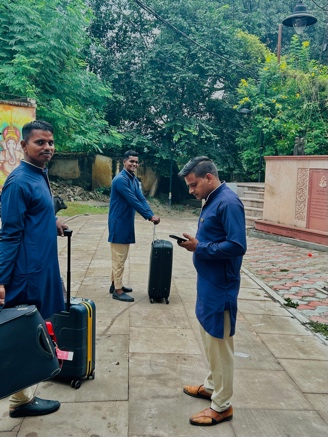
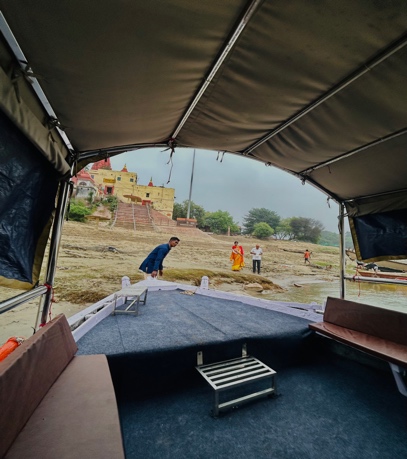
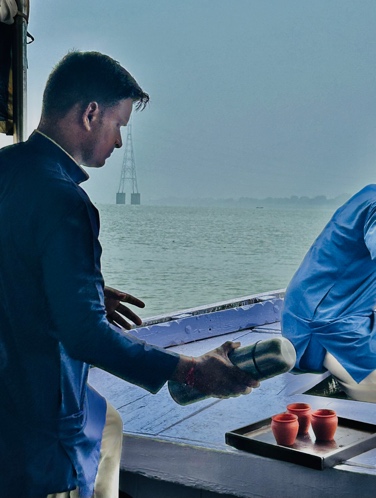
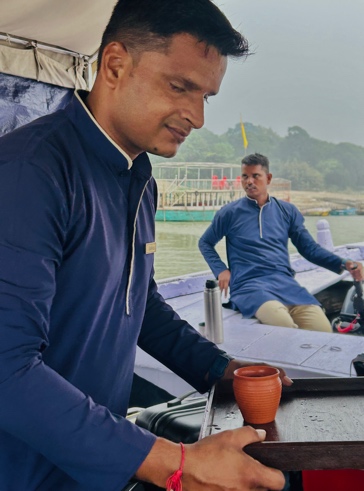
Clockwise from Top Left: Receiving party of three at the Car drop off point, Image of Boat-shuttle, Staff shaking up lime water, Staff Serving lime water in clay goblets, October 2024
The BrijRama luxury experience is unrivalled in the way that it has been seamlessly and almost imperceptibly woven into the setting as opposed to obtrusively announcing its presence and thereby undermining it; nothing is overstated and yet every little detail has been meticulously attended to, the most striking example the masterful 18 year-long restoration of a building that was erected in 1812 and bought over by the BrijRama hospitality group in 1994.
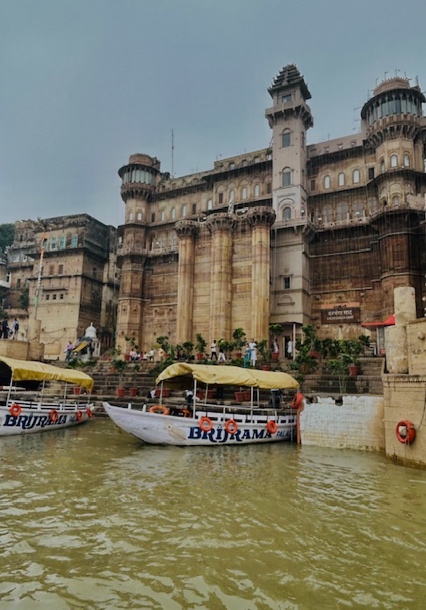
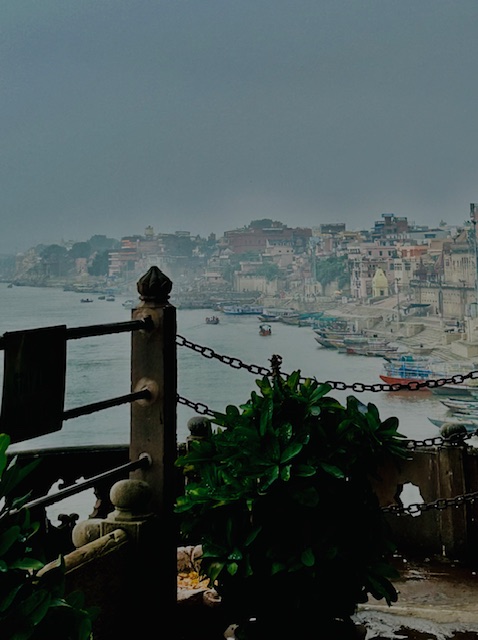

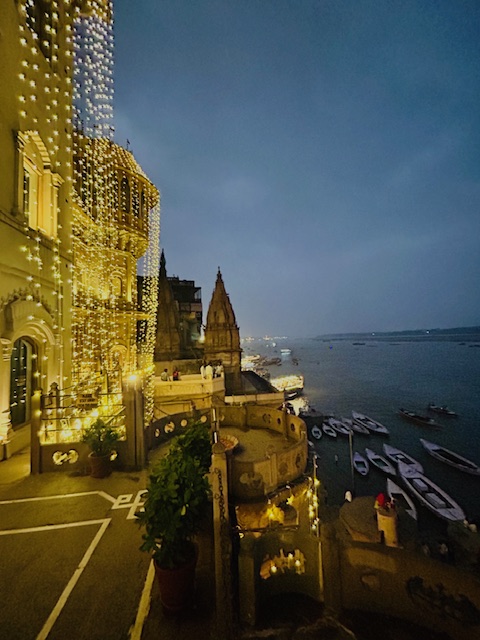

Clockwise from Top Left: Arrival at the BrijRama Palace Hotel, View from Main Lobby verandah of the Hotel, Night time image of the Hotel all lit up for Diwali, October 2024
The interior décor and design of the common areas whilst traditional, are all at once elegant and colourful, rich yet subtle … there are several categories of rooms, each and every one of them perfectly comfortable and pleasing to the eye, yet clearly intended for rest rather than any form of languid recreational activity within the four walls; the Varuna Burj suites are of course an exception, and I suggest you ask for a peek when you are there, for they must be seen to be believed.
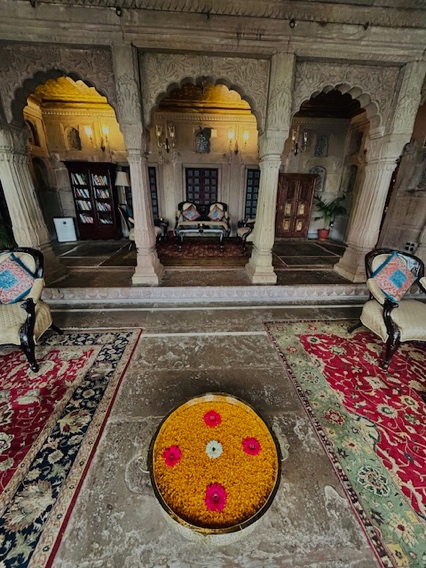
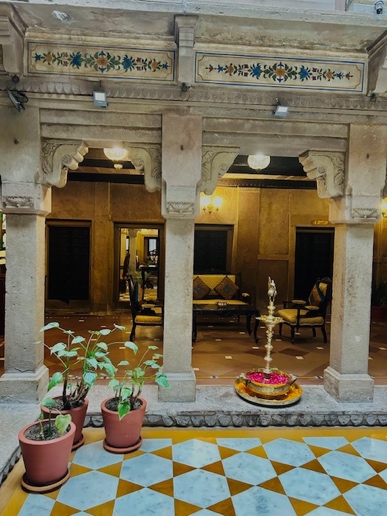
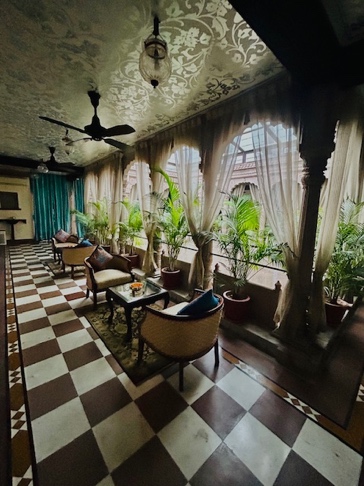

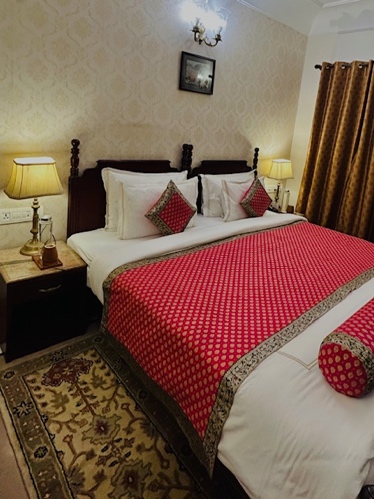
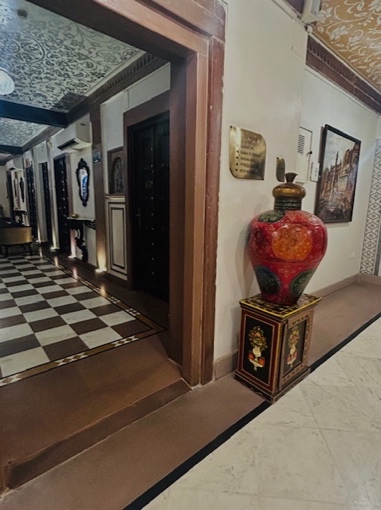
Clockwise from Top Left: Main Lobby of the Hotel, Inner courtyard of the hotel, Corridor on the second floor, one of the pretty corners of the Second floor, Nadidhara Category of Bedroom, Side view of hotel façade lit up for Diwali in October 2024, taken from Lobby Verandah
It is a turnkey experience that the BrijRama Palace hotel provides, right from the masterfully executed local vegetarian fare at the hotel itself, whether in the main restaurant, roof top terrace or double decker dining boat, Ganga Aarti viewing by boat, excursions to the Kashi Vishwanath temple accompanied by a pandit who chaperones you right from the hotel and guides you through the prescribed rituals at the temple, tours to Sarnath where the Buddha taught his first sermon after attaining enlightenment, guided culinary walks in a city renowned for its exemplary chaat (street food) – these last two activities I have yet to engage in – a flautist that serenades the guests through the day in the inner sanctum of the hotel, cultural performances every evening, a post dinner ‘paan wala’ stall that is akin to an art installation, the ‘paan waala’ himself a skilled craftsman in the various types and techniques of paan making…indeed there is no stone left unturned in giving the guests a comprehensive Varanasi immersion.
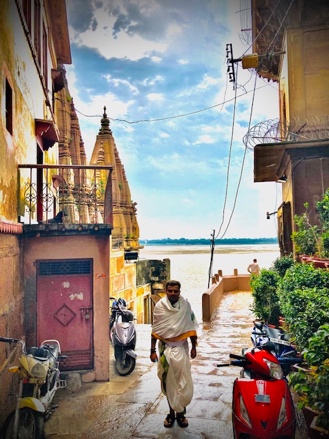
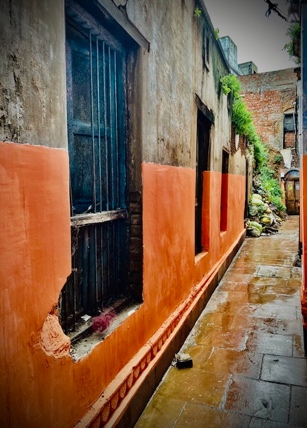
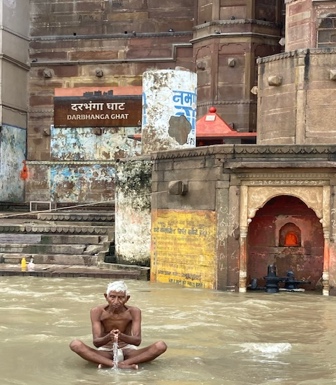

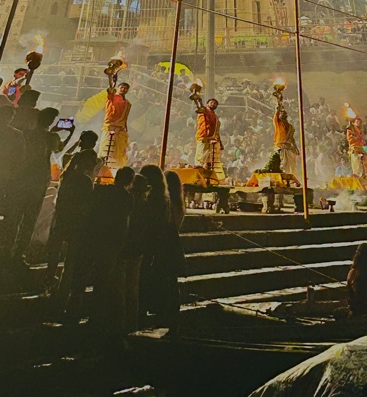
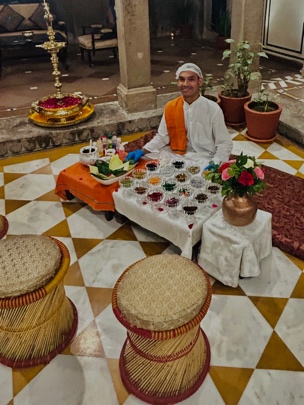

Clockwise from Top Left: Pandit standing outside the side entrance of the hotel, September 2021, colorful little lane on the walk to Kashi Vishwanath temple, September 2021, Man bathing in the ganga at Darbhanga Ghat, September 2021, Paan Wala and his stall, October 2024, Ganga Aarti, October 2024
The sumptuous breakfast and high tea are included in the steep room rate, as is a complimentary foot massage, the evening cultural performances, after-dinner paans, boat shuttle services and the evening ganga arti by boat. Moreover, all the contents of the mini bar in each room are complimentary, comprising soft drinks, a whole host of snacks such as flavoured almonds and cashew nuts, and there is also a wonderful little personal espresso machine with high quality coffee capsules … all of the above, in consort with the impeccable service, quite frankly justify the price …
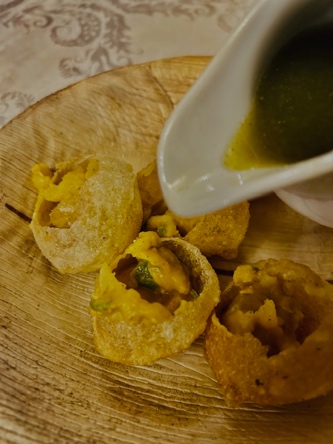
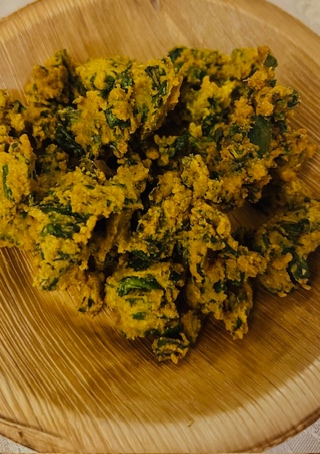
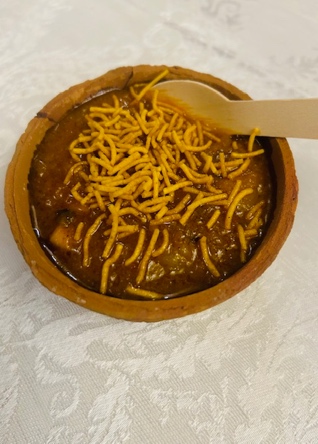

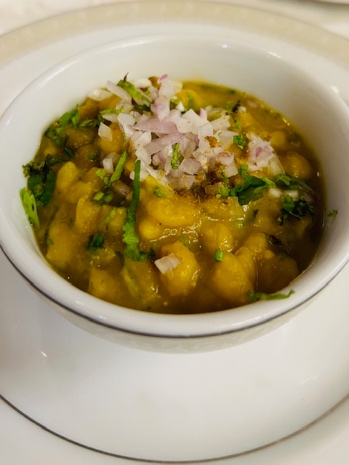
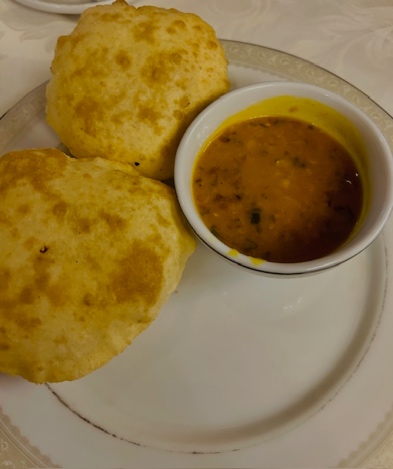
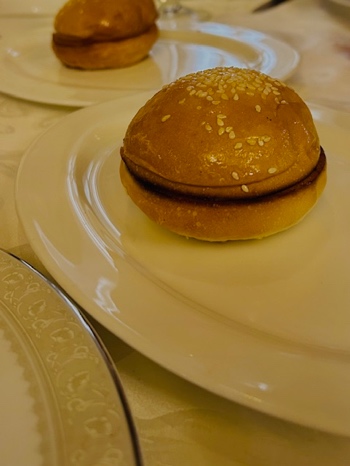



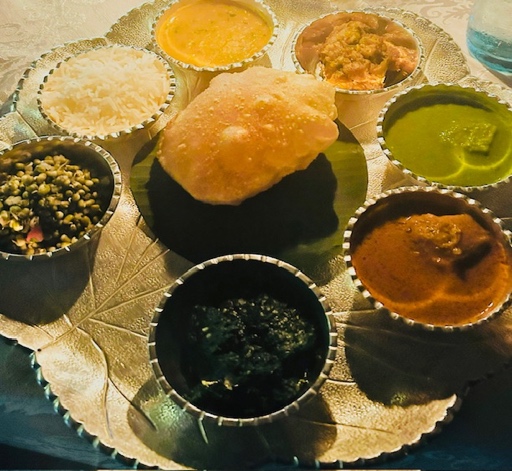


Top Row, Left to right: High-tea specialities of the most perfect Gol Gappas, scrunchy spinach pakora and the famous tomato chaat, the last sourced from Varanasi by the Ambanis for their son’s wedding festivities
Middle Row, Left to Right: Local Breakfast of Matar Chaat, Chana Dal with Luchi, White Butter Bun
Bottom: The Dinner Thali including local specialties of Dum aloo, Khatta Meetha Kaddu and Nimona: a green pea curry, October 2024
… And finally, the culinary ‘piece de resistance’, without which an experience of Varanasi cannot be complete, are two milk based sweets, Malaiyo and Rabri, available at road side vendors along all routes leading to the Kashi Vishwanath Temple, the former a featherweight milk foam made uniquely during the winter months, which triumphs any day over its western molecular counterparts, the latter, whilst more popular, of a texture and taste that cannot be equalled, for it is sheer perfection …

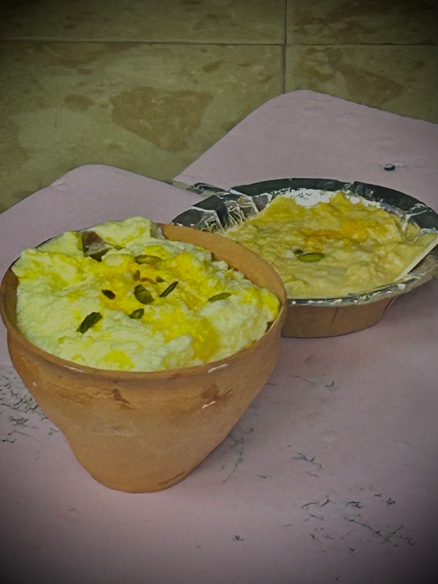
Above, left to right: Vendor serving up the rabri, one serving each of Malaiyo & Rabri, October 2024
… and on that delicate and delicious note, I shall bring this little personal anecdote to a close, hoping I have given you sufficient reason to go to Varanasi and to do it The BrijRama way.
THE END
